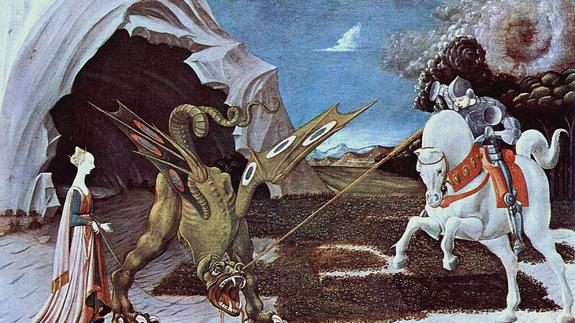

Secciones
Servicios
Destacamos

Tony Bryant
Friday, 21 April 2017, 15:55
Sunday 23 April is the day when English nationals celebrate St Georges Day.
However, even though he is perhaps one of Christianitys most venerated saints, the English seem to have virtually turned their backs on him over the years.
His achievements have been questioned by the scholarly and his life is something of a mystery, and much of what we know is based on legend.
St George is believed to have served as a soldier in the Roman army during the latter part of the 3rd century AD, but resigned in protest of the Emperors persecution of Christians.
He was then imprisoned for refusing to renounce Christianity and was eventually beheaded by the Emperor Diocletian.
It was his celebrated combat with a dragon that set him apart from most of his fellow martyrs, and the account of this heroic slaying comes from the Golden Legend, which was written in the thirteenth century.
It is believed that he was adopted in England because the story in The Golden Legend was similar to an old Anglo-Saxon legend.
However, St Georges Day celebrations are often more low key than the razzmatazz events connected to some of his fellow saints.
With the odd exception, celebrations are virtually nonexistent here on the coast and the day will often pass without much ado, largely down to the fact that many are unaware of the occasion.
A recent survey carried out in England claimed that only one in five people know that St Georges Day falls on April 23. The same survey suggested that 25 percent of English people do not even know who their patron saint is.
It would seem that a good majority of English nationals prefer to celebrate St Patricks Day in preference to their own martyr, and there are those who believe that Englands patron saint should be defrocked.
A poll carried out by a British tabloid newspaper in 2003 suggested that St George should be ousted as Englands patron saint and replaced by St Alban. This notion was also backed by several prominent clergy from the Church of England.
The major sources on St Albans life were written hundreds of years after his death, and many of the later texts contain additions and embellishments that probably did not occur.
Alban and George
St Alban, who is venerated as the first recorded British Christian martyr, and St George lived in the same era, and were both beheaded by the Romans for refusing to renounce Christianity. Although knowledge of both men is based more on legend than fact, St Alban was English, whereas St George was not.
St George has suffered many indignities since he was adopted by the English in the fourteenth century and scholars have ridiculed his dragon slaying exploits.
He is identified with English ideals of honour, bravery and gallantry, but he was not English and he is not thought to have visited Britain. This alone may explain why so many remain sceptical of his suitability as Englands patron saint: his association with other countries is perhaps another reason.
St George is not only the patron saint of England, but also of Aragon, Catalonia, Cáceres, Georgia, Lithuania, Palestine, Portugal, Germany, Greece and Moscow.
Hes also patron saint of soldiers, archers, cavalry and chivalry, farmers and field workers.
However, St George was not the first patron saint of England, that honour was originally held by St Edmund in the ninth century.
St Edmunds influence began to fade during the Third Crusade in 1199, when King Richard I visited the tomb of St. George in Palestine on the eve of a battle. Following his great victory the next day, Richard adopted St. George as his personal patron and protector of the army.
In 2006, an attempt was made to have St Edmund reinstated as patron saint of England, but the petition was rejected by the British government.
For the moment, it would appear that St George has managed to fight off his contenders in much the same way as he did the legendary dragon, and his patronage, at least for the foreseeable future, would seem to be secure.
In recent years he has been adopted as patron saint of Scouts. The Scout Association takes part in parades all across England on St Georges Day; one of the biggest being the parade of the Queen Scouts that takes place at Windsor Castle each year.
Publicidad
Publicidad
Publicidad
Publicidad
Esta funcionalidad es exclusiva para registrados.
Reporta un error en esta noticia

Debido a un error no hemos podido dar de alta tu suscripción.
Por favor, ponte en contacto con Atención al Cliente.

¡Bienvenido a SURINENGLISH!

Tu suscripción con Google se ha realizado correctamente, pero ya tenías otra suscripción activa en SURINENGLISH.
Déjanos tus datos y nos pondremos en contacto contigo para analizar tu caso

¡Tu suscripción con Google se ha realizado correctamente!
La compra se ha asociado al siguiente email
Comentar es una ventaja exclusiva para registrados
¿Ya eres registrado?
Inicia sesiónNecesitas ser suscriptor para poder votar.